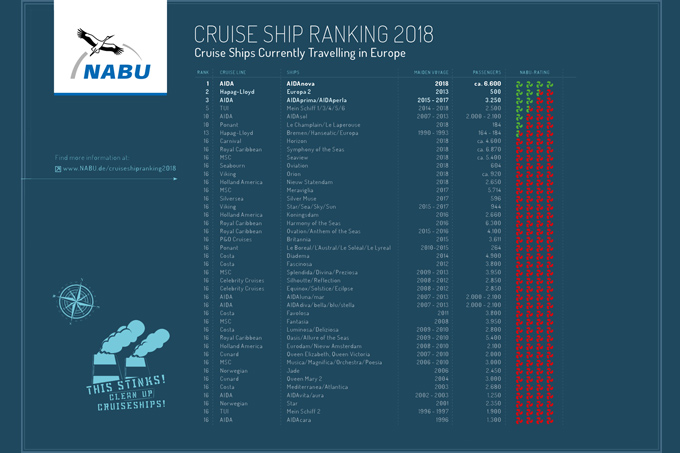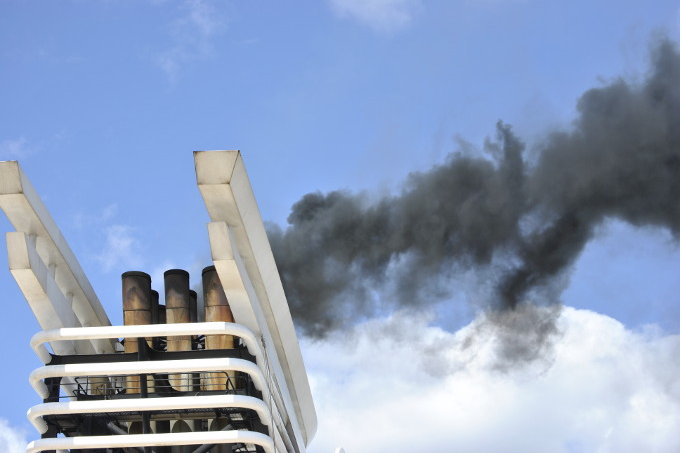NABU Cruise Ship Ranking 2018: AIDA at the top
Most companies still doing business the dirty way

Cruise ship - photo: Kay Ludwig
21th august 2018 - Just one newly built cruise ship renounces the use of toxic heavy fuel oil (HFO) and uses a less polluting fuel. AIDA Nova will be the first cruise ship using liquefied natural gas (LNG). Therefore the newly built ship tops NABU’s 2018 cruise ship ranking. All remaining 76 checked ships, even eight out of nine vessels coming new into the market this year, will continue to use heavy fuel oil, the dirtiest of all fuels. Especially the giants MSC Cruises, Carnival Cruise and Royal Caribbean have nothing to show in the area of air pollution reduction.
Only Hapag Lloyd Cruises and TUI Cruises are keeping up a little in using SCR catalysts or on-shore power while in port on their new vessels. But a particulate filter to reduce the harmful soot particles is not installed on these ships either.
More information
The following measures are ranked as beneficial regarding air pollutant emission reduction:
- TUI Mein Schiff 1 / 3 / 4 / 5 / 6: SCR-Catalytic System, Scrubber is always in use even outside SECA
- Hapag-Lloyd Europa 2: SCR-Catalytic System, On Shore Power Supply in Port. No use of Heavy Fuel Oil in Arctic Waters
- AIDAprima/perla*: use of alternative energy in Ports, Catalytic System and Particulate Filter partially in operation
- AIDAsol: On Shore Power Supply in Port
- Ponant Le Champlain/Le Laperouse: SCR-Catalytic System
- Hapag-Lloyd Bremen / Hanseatic / Europa: No use of Heavy Fuel Oil in Arctic Waters
All vessels operating on heavy fuel oil or only bring their exhaust to legally permitted level by means of a scrubber are rated with four red propellers. For each measure, beyond this, individual ships receive proportionately green propellers, allowing them to be placed in the ranking ahead of its competitors.
*AIDAprima and AIDAperla are equipped with Soot Particle Filter and SCR-Catalytic System but regarding the company, the exhaust treatment is unfortunately not operational.
NABU CEO Leif Miller: “It is scandalous that in 2018 there are still ships coming into the market which are built to use heavy fuel oil as fuel. In all major port cities in Europe people are suffering from highly polluted air due to the growing cruise industry. But the ship owners are not taking their responsibil-ity. With friendly words you will not get any changes, so port cities and coastal communities are now asked to ban dirty ships like Norway is doing it for some of their Fjords to protect the people and the environement." Only in doing this the risks for citizens and the sensitive eco-systems can be reduced.
Dietmar Oeliger, Head of Transport at NABU headquarters: “For the first time, in 2018 a cruise ship with liquefied natural gas propulsion will set sail. The use of LNG reduces harmful air pollution significantly and residents of port cities and coastal areas will be allowed to breathe cleaner air. It is praiseworthy, that AIDA stepped forward and chose less polluting technologies for their new ships. Now the competitors are also asked to step up and to invest in clean new ships. Nonetheless, all companies also need to find solutions for cleaning the exhaust gases of their existing fleets as these ships are still the most pressing pollution sources.”
Furthermore LNG is not the salvation for the shipping industry, as it is still a fossil fuel. The numbers arguing in favour of LNG are often inaccurate. “A recently published study of our umbrella organisation T&E shows that LNG brings no advantages regarding greenhouse gas reduction compared to diesel”, states Oeliger. Because of that the industry is asked to develop propulsion systems which not only reduce air pollution but which are also CO2 neutral. Without a general shift in the shipping industry the climate goals set under the Paris Agreement will not be accomplished.
More
Pollution from the cruise ship industry is still massive, despite claims newer vessels are clean and green. No company comes recommended in NABU’s 2017 cruise ship rankings, which show just how little progress companies have made towards cutting pollution. more →
From an environmental and health point of view none of the european cruise ships is recommendable at the moment. That is the result of the NABU cruise ship ranking 2016. more →
The cruise ships of the leading providers become cleaner, but still there are too few ships with environmental friendly emission abatement technique. This is a result of the current cruise ship ranking presented by NABU. more →


